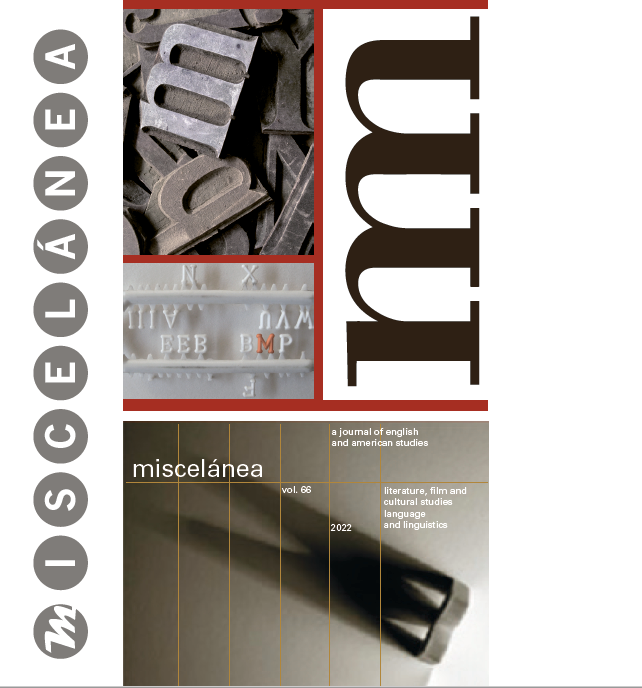La Expansión de la Consciencia, Consciencia Integral y Evolución Consciente en la obra de ficción de Paule Marshall
DOI:
https://doi.org/10.26754/ojs_misc/mj.20226912Palabras clave:
expansión de la consciencia, consciencia integral, evolución consciente, consciencia negra, unidadResumen
Las preocupaciones literarias de la escritora afro-americana Paule Marshall ponen de relieve dos aspectos importantes de la diáspora africana como son la consciencia de los afro-descendientes y la búsqueda de la integridad por el ser humano. Esta temática enlaza con diversas investigaciones sobre la consciencia humana llevadas a cabo por científicos como el físico Peter Russell, el filósofo Ken Wilber y la psicóloga Paloma Cabadas. Este ensayo defiende que los personajes creados por Marshall experimentan un necesario salto de consciencia en su búsqueda por la integridad y la lucidez. La ficción creada por Marshall forma parte del movimiento por la consciencia afro-descendiente ya que contribuye al desarrollo de epistemologías que entroncan con el pasado, creando conocimiento emancipador para los afro-descendientes. La metodología empleada para analizar la literatura de Marshall se basa en el paradigma de evolución consciente desarrollado por Paloma Cabadas y el modelo de consciencia integral elaborado por Ken Wilber. Ambas teorías ofrecen rutas válidas para explorar los personajes de ficción de Marshall a la luz del concepto de la expansión de la consciencia propuesto por Margaret Newman.
Descargas
Referencias
BAKARI, Sentwali R. 1997. “Epistemology from an Afrocentric Perspective: Enhancing Black Students’ Consciousness through an Afrocentric Way of Knowing”. <http://digitalcommons.unl.edu/pocpwi2/20>. Accessed April 15, 2020.
CABADAS, Paloma. 2018. La Muerte Lúcida. Madrid: Parámetro 100.
---. 2015. El Trauma Nuclear de la Conciencia. Extirpar el Sufrimiento de Raíz. Madrid: Parámetro 100.
CUMBER, Daryl. 1992. “An Interview of Paule Marshall”. The Southern Review 28 (1). < https://scholarship.richmond.edu/english-faculty-publications/?utm_source=scholarship.richmond.edu%2Fenglish-faculty-publications> Accessed June 15, 2022.
ESBJORN-HARGENS, SEAN. 2009. “An Overview of Integral Theory. An All-Inclusive Framework for the 21sth Century.” Integral Institute, Resource Paper (1): 1-24. <http://www.integralacademy.eu/about/about-integral-theory/an-all-inclusive-framework-for-the-21st-century>. Accessed August 15, 2022.
FREIRE, Paulo.1985. The Pedagogy of the Oppressed. Translated by M.B. Ramos. New York: Continuum.
GAVIN, Jones. 1998. “The Sea Ain’t Got No Back Door: The Problems of Black Consciousness in Paule Marshall’s Brown Girl, Brownstones”. African American Review (32.4): 597-606.
GARRY, Jane. 2016. Archetypes and Motifs in Folklore and Literature: A Handbook. New York: Routledge.
GRAULICH, Melody and Lisa SISCO. 1992. “Meditations on Language and the Self: A Conversation with Paule Marshall”. NWSA Journal 4 (3): 282-302.
HURSTON, Zora Neale. (1942). 1991. Dust Trucks on a Road. An Autobiography. New York: Harper Collins.
JUNG, Carl. (1941). 2014. Aion. Researches in the Phenomenology of the Self. New Jersey: Princeton UP.
KÜBLER-ROSS, Elisabeth. 1999. The Tunnel and the Light. Essential Insights in Living and Dying. New York: Marlow.
MARSHALL, Paule. (1959). 1981. Brown Girl, Brownstones. New York: The Feminist Press.
MARSHALL, Paule. 1983. Reena and other Stories. New York: The Feminist Press.
MARSHALL, Paule. 1983. Praisesong for the Widow. New York: Plume.
MARSHALL, Paule. 1983. “From the poets in the Kitchen”. Callaloo, vol. 0. Issue 18 (Spring-Summer), 22-30.
MARSHALL, Paule. 1991. Daughters. New York: Plume.
MARSHALL, Paule. 1999. “Black Literature in the ‘90s: The Past as Prologue to ‘The New Wave’. In Elizabeth Nuñez and Brenda M. Greene (eds.) Defining Ourselves. Black Writers in the 90s. New York: Peter Lang:25-36.
MARSHALL, Paule. 2009. Triangular Road. A Memoir. New York: Basic Civitas.
McIntosh, Steve. “What is Integral Philosophy” <https://www.stevemcintosh.com/blog/what-is-integral-philosophy/#:~:text=Integral%20philosophy%20is%20a%20spiritual,the%20process%20of%20evolution%20overall>. Accessed 29 June 2021.
NABUDERE, D. W. 2011. Afrikology, Philosophy and Wholeness. An Epistemology. Pretoria: Africa Institute of South Africa.
NEWMAN, Margaret A. 1994. Health as Expanding Consciousness. Boston: Jones & Burlet.
NEWTON, Michael. 2010. Memories of the Afterlife. Life-Between-Lives. Woodbury: Llewellyn.
OKOLO, O. 1991. “Tradition and Destiny: Horizons of an African Philosophical Hermeneutics”. In Tsenay Serequeberhan (ed.) African Philosophy. The Essential Readings. New York: Paragon House:201-211.
PETTIS, Joyce. 1995. Toward Wholeness in Paule Marshall’s Fiction. Charlottesvillle: University Press of Virginia
RUSSELL, Peter. “The Reality of Consciousness”. <https://www.peterrussell.com/SCG/realityconsc.php>. Accessed August 21, 2021.
RYAN, Judylyn S. 2005. Spirituality as Ideology in Black Women’s Film and Literature. Charlottesville: University Press of Virginia.
THREE INITIATES. (1912). 2004. The Kybalion, eBook < https://www.gutenberg.org/cache/epub/14209/pg14209.html> Accessed June 29, 2021.
WASHINGTON, Mary Helen. 1981. “Afterword” to Brown Girl, Brownstones. 311-324. New York: The Feminist Press.
WEISS, Brian. 1993. Through Time into Healing. Simon & Schuster: New York.
WILBER, Ken. 1975. “Psychologia Perennis: The Spectrum of Consciousness”. Journal of Transpersonal Psychology 7 (2): 105-132.
WILBER, Ken. 1997. “An Integral Theory of Consciousness” . Journal of Consciousness Studies 4 (1): 71-92.
WILLIAMS, John. 1986. “Return of a Native Daughter: An Interview with Paule Marshall and Maryse Condé”. Sage 3 (Fall): 52-53.
Descargas
Publicado
Número
Sección
Licencia
Derechos de autor 2022 silvia castro borrego

Esta obra está bajo una licencia internacional Creative Commons Atribución-NoComercial 4.0.


